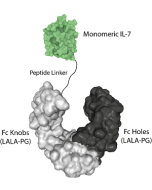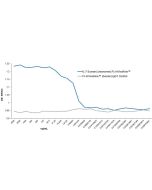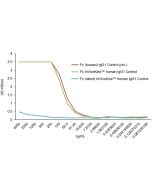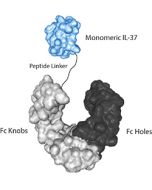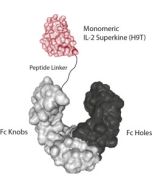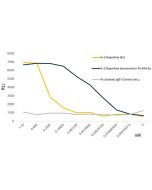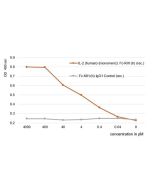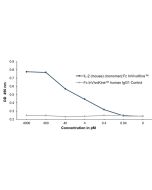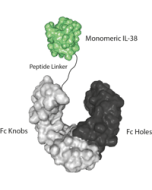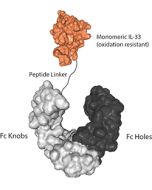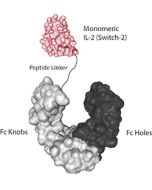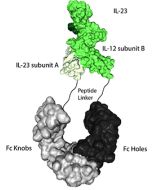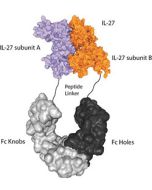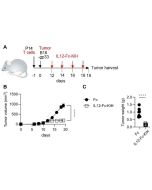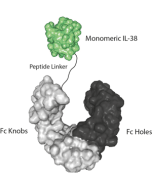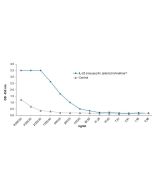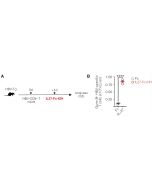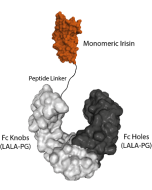Cookie Policy: This site uses cookies to improve your experience. You can find out more about our use of cookies in our Privacy Policy. By continuing to browse this site you agree to our use of cookies.
AdipoGen Life Sciences
IL-7 (mouse) (monomer):Fc (silent) InVivoKine™

| Product Details | |
|---|---|
| Synonyms | IL-7 (mouse) (monomer):Fc (LALA-PG) KIH (human) (rec.); Interleukin-7 |
| Product Type | Protein |
| Properties | |
| Source/Host | HEK 293 cells. Produced using animal component-free medium. |
| Sequence |
Mouse IL-7 (aa 26-154) is fused at the C-terminus to the Fc portion of human IgG1 (LALA-PG) (Knobs-into-Holes technology) (see reference: J.B. Ridgway, et al.; Protein Eng. 9, 617 (1996)). |
| Crossreactivity | Mouse |
| Specificity |
Binds to mouse IL-7R. The Fc contains the mutations LALA-PG that abolish the interaction between the Fc and FcγRs and therefore Fc undesirable effects. The Fc (LALA-PG) is named Fc (silent). |
| Biological Activity |
Activates CD4+ T Cells proliferation. |
| MW | ~55kDa and 28kDa (SDS-PAGE) |
| Purity | ≥95% (SDS-PAGE) |
| Endotoxin Content | <0.01EU/μg protein (LAL test). |
| Concentration | After reconstitution: 1mg/ml |
| Reconstitution | Reconstitute with 50μl endotoxin-free water. |
| Accession Number | P10168 |
| Formulation | Lyophilized. Contains PBS. |
| Protein Negative Control |
Fc (silent) InVivoKine™ (human) IgG1 Control (Prod. No. AG-35B-0018) |
| Other Product Data |
Uniprot link P10168: IL-7 (mouse) |
| Shipping and Handling | |
| Shipping | BLUE ICE |
| Short Term Storage | +4°C |
| Long Term Storage | -20°C |
| Handling Advice |
After reconstitution, prepare aliquots and store at -20°C. Avoid freeze/thaw cycles. Centrifuge lyophilized vial before opening and reconstitution. PBS containing at least 0.1% BSA should be used for further dilutions. |
| Use/Stability |
Stable for at least 6 months after receipt when stored at -20°C. Working aliquots are stable for up to 3 months when stored at -20°C. |
| Documents | |
| MSDS |
 Download PDF Download PDF |
| Product Specification Sheet | |
| Datasheet |
 Download PDF Download PDF |
Interleukin-7 (IL-7) is a hematopoietic growth factor and a member of the IL-7/IL-9 family, which is produced by fetal liver cells, stromal cells in the bone marrow (BM), thymus and other epithelial cells, including keratinocytes and enterocytes. The receptor of IL-7, IL-7R, is a heterodimeric complex consisting of the α-chain (CD127) and the common cytokine receptor γ-chain, shared with the receptors for IL-2, IL-4, IL-7, IL-9, IL-15 and IL-21, and expressed in a variety of cells. IL-7 has a critical developmental function at every stage of T cell development, for both αβ and γδ lineages, and for the development and survival of naive T cells as well as generation and maintenance of CD4 and CD8 memory. IL-7 is also essential for the development and maintenance of the new ILCs. IL-7 is important throughout hematopoiesis, facilitating key lineage fate decisions. IL-7 is thought to support aberrant immune activity in autoimmune diseases such as diabetes and multiple sclerosis and in chronic inflammatory diseases such as rheumatoid arthritis, ankylosing spondylitis and inflammatory bowel disease. IL-7 contributes to leukemia development in vivo and also stimulates multiple immune-mediated mechanisms that contribute to the eradication of tumors.
The IL-7 (mouse) (monomer):Fc (silent) InVivoKine™ is produced by using two different vectors, one encoding for the IL-7 (mouse):Fc (LALA-PG) Knobs sequence (synthesizing a protein of 55kDa) and one encoding for the Fc (LALA-PG) Holes sequence (synthesizing a protein of 28kDa). Both vectors transfected into HEK293 cells produce both Fc molecules (Knobs-into-Holes technology; J.B. Ridgway, et al.; Protein Eng. 9, 617 (1996)) required for dimerization of the Fc moieties and for secretion of the final protein IL-7 (mouse) (monomer):Fc (silent) InVivoKine™. The LALA-PG mutations inhibit binding to FcγRs and C1q while FcRn binding and Fc stability remain unaffected.
InVivoKines™ are a new generation of recombinant fusion proteins for immunotherapeutic, preclinical and translational in vivo research, developed and manufactured by AdipoGen Life Sciences.






